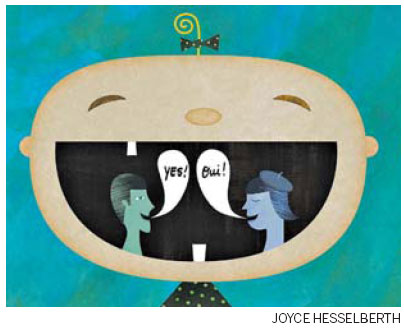Infants' brains thrive In a bilingual world
Updated: 2011-11-06 07:43
By Perri Klass, M.D. (The New York Times)
|
|||||||||

While many parents recognize the utility of a second language for their child, families trying to juggle two languages at home are often desperate for information.
But as the relatively new science of bilingualism pushes back to the origins of speech and language, scientists are teasing out the earliest differences between brains exposed to one language and brains exposed to two.
Recently, researchers at the University of Washington used measures of electrical brain responses to compare so-called monolingual infants to bilingual infants. Of course, since the subjects of the study ranged from 6 months to 12 months of age, they weren't producing many words in any language.
Still, the researchers found that at 6 months, the monolingual infants could discriminate between phonetic sounds, whether they were uttered in the language they were used to hearing or in another language. By 10 to 12 months, however, monolingual babies were no longer detecting sounds in the second language.
The researchers suggested that this represents a process of "neural commitment," in which the infant brain wires itself to understand one language.
In contrast, the bilingual infants followed a different developmental trajectory. At 6 to 9 months, they did not detect differences in phonetic sounds in either language, but when they were 10 to 12 months they were able to discriminate sounds in both.
"What the study demonstrates is that the variability in bilingual babies' experience keeps them open," said Dr. Patricia Kuhl, co-director of the Institute for Learning and Brain Sciences at the University of Washington. "They do not show the perceptual narrowing as soon as monolingual babies do. It's another piece of evidence that what you experience shapes the brain."
The learning of language - and its effects on the brain - may begin even earlier than 6 months.
Janet Werker, a professor of psychology at the University of British Columbia, said newborns have been shown to prefer languages rhythmically similar to the one they've heard during fetal development.
In one recent study, Dr. Werker and her collaborators showed that babies born to bilingual mothers not only prefer both languages, but are also able to register that the two languages are different.
In a study of older infants shown silent videotapes of adults speaking, 4-month-olds could distinguish different languages visually by watching mouth and facial motions and responded with interest when the language changed. By 8 months, though, the monolingual infants were no longer responding to the difference in languages in these silent movies, while the bilingual infants continued to be engaged.
"For a baby who's growing up bilingual, it's like, 'Hey, this is important information,'" Dr. Werker said.
Over the past decade, Ellen Bialystok, a distinguished research professor of psychology at York University in Toronto, has shown that bilingual children develop crucial skills in addition to their double vocabularies, learning different ways to solve logic problems or to handle multitasking, skills that are often considered part of the brain's so-called executive function.
These higher-level cognitive abilities are localized to the frontal and prefrontal cortex in the brain. "Overwhelmingly, children who are bilingual from early on have precocious development of executive function," Dr. Bialystok said.
Dr. Kuhl calls bilingual babies "more cognitively flexible" than monolingual infants.
The New York Times